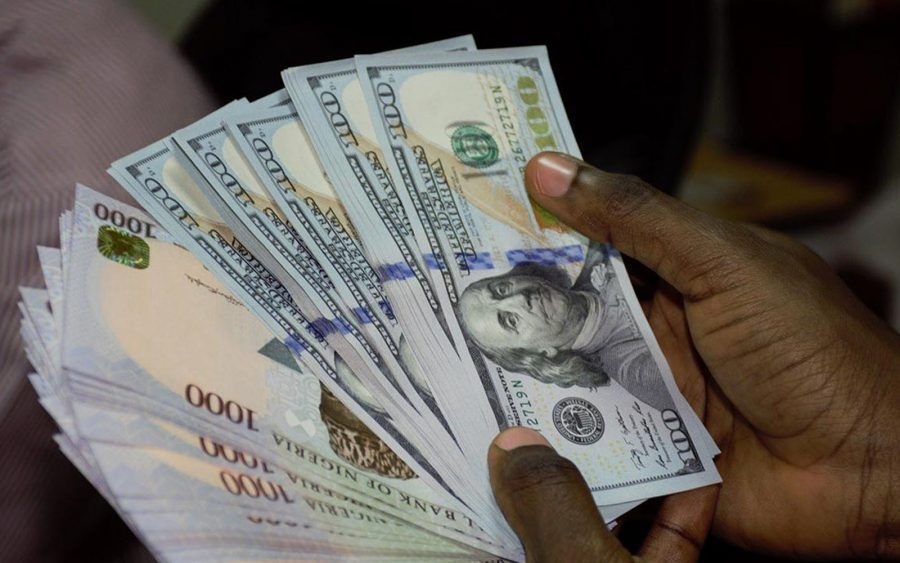Thursday, 4th November 2021: The exchange rate between the naira and the US dollar closed at N415.1/$1, at the official Investors and Exporters window. The Naira depreciated against the US dollar to close at N415.1/$1 on Thursday 4th November 2021, representing a 0.07% decline compared to N414.8/$1 recorded at the close of trading activities on Wednesday.
On the other hand, the naira remained flat against the US dollar at the parallel market on Thursday to close at N570/$1, the same as recorded at the close of trading activities on Wednesday, 3rd November 2021. This is according to information obtained by Nairametrics from BDC operators in Lagos.
Nigeria’s foreign reserve continued on a decline on Wednesday with a 0.05% drop to close at $41.76 billion on 3rd November 2021. This represents a $19.32 million decline compared to $41.78 billion recorded as of Tuesday, 2nd November 2021.
Trading at the official NAFEX window
The exchange rate depreciated against the US dollar on Thursday, 4th November 2021, to close at N415.1/$1 compared to N414.8/$ recorded in the previous trading session. This represents a 0.07% decline in the country’s exchange rate.
The opening indicative rate closed at N414.49/$1 on Tuesday. This represents a 73 kobo depreciation compared to N413.76/$1 recorded in the previous trading day.
An exchange rate of N444 to a dollar was the highest rate recorded during intra-day trading before it settled at N415.1/$1, while it sold for as low as N404/$1 during intra-day trading. The highest rate recorded during the day has been the same in the past seven trading sessions.
Forex turnover at the official window reduced marginally by 239% to $129.54 million on Thursday.
According to data tracked by Nairametrics from FMDQ, forex turnover at the I&E window decreased from $133.37 million recorded on Wednesday 3rd November 2021 to $129.54 million on Thursday 4th November 2021.
Cryptocurrency watch
The cryptocurrency market also traded bearish on Thursday, as the total industry market capitalisation dipped by 1.86% as of 10:48 pm on Thursday to stand at $2.694 trillion, representing a $50.62 billion loss to crypto investors.
The general downturn was driven by the bearish trade in Bitcoin, which dipped 2.36% to trade at $61,442.52, while Ethereum lost 1.76% to trade at $4,525.87.
Avalanche Foundation, the organization behind the Avalanche chain, has announced the launch of Blizzard, a fund that will entice development and innovation on the Avalanche ecosystem. The Fund, which has $200 million available for its task, is composed of contributions coming from Avalanche Foundation, Ava Labs, Polychain Capital, Three Arrows Capital, among other participants.
Meanwhile, Goldman Sachs has reportedly explained in a research note circulated by the bank’s managing director of Global Markets, Bernhard Rzymelka, that the price of Ether (ETH) could hit $8,000 by year-end. The note details that, cryptocurrencies have traded in line with inflation breakevens since 2019, according to Zerohedge.
Crude oil price
The crude oil market extended its bearish run, on Thursday as Brent Crude dipped 1.34% to close at $80.89 per barrel as OPEC+ decided to continue easing their collective crude oil production cuts by 400,000 barrels per day in the coming months.
West Texas Intermediate also closed in the red with 1.89% decline to close at $78.87 per barrel, OPEC Basket dropped 2.15% to close at $81.58 per barrel. However, Natural Gas gained marginally by 0.81% to close at $5.716.
Nigeria’s crude, Bonny Light dipped 2.91% to close at $81.85 per barrel on Thursday, while Brass River and Qua Iboe lost 4.11% to close at $81.28 per barrel.
The OPEC+ meeting which was unable to address concerns of countries like Nigeria and Angola who are struggling to meet their quota reiterated the commitment of the group in ensuring a stable and balanced oil market, the efficient and secure supply to consumers and to provide clarity to the market at times when other parts of the energy complex outside the boundaries of oil markets are experiencing extreme volatility and instability.
External reserve
Nigeria’s foreign reserve declined for the fourth consecutive day, having recorded continuous positive growth in the past two months. The reserve level dipped marginally by 0.05% to close at $41.76 billion as of 3rd November 2021, compared to $41.78 recorded the previous day.
Meanwhile, the nation’s foreign reserve gained $5.04 billion in the month of October, on the back of the $4 billion raised by the federal government from the issuance of Eurobond in the international debt market. The gains recorded in the previous month were higher than the $2.76 billion gain recorded in the month of September 2021, while the recent decrease puts the year-to-date gain at $6.38 billion.
So far in the month of November, Nigeria’s reserve has lost $64.21 million. While the reason for the recent decline still remains unclear, oil prices have been trading bearish in the past three days as WTI closed below $80 per barrel on Thursday.










